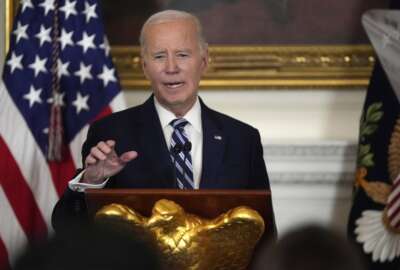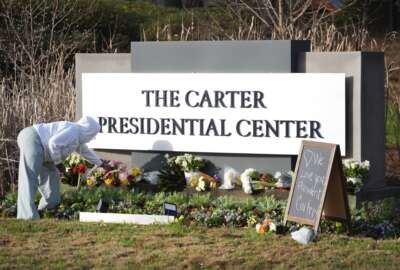Mexico’s ruling party, others caught in old tricks
Corruption scandals, fugitive governors and reports of intimidation reflect what many Mexicans perceive as a return by the ruling Institutional Revolutionary Party...
MEXICO CITY (AP) — The scene was so typical of Mexico’s long-dominant ruling party that it could have happened a half-century ago: poor women lined up under a blazing sun, waiting for a politician to show up hours late for a rally they had been obliged to attend under threat of losing benefits from an anti-poverty program.
But unlike a half-century ago, there were a couple of independent media outlets interviewing the women, who were hot, tired and outraged that a government program would be used for political purposes.
The venting ended abruptly when Institutional Revolutionary Party workers arrived to kick out the reporters and tell the women to stop talking. Bruisers took a cameraman’s equipment and physically ejected him from the stadium where the event was being held, threatening to “disappear” him and other journalists.
“When they took us into the (stadium’s) bathroom, they said ‘you’re going to die.’ That’s when I really got scared,” said David Morales, director of the internet news service Chiapas Without Censorship, describing interviewing women at a rally in Tuxtla Gutierrez for PRI Sen. Roberto Albores Gleason over the weekend.
Such threats are terrifying in rural Mexico, where dozens of journalists have been killed in recent years. And they reflect what many perceive as a return to its corrupt, old practices by the ruling PRI, as it fights for its life in June gubernatorial elections in some of its last bastions — Mexico State and the northern state of Coahuila.
The PRI ruled Mexico for 71 years, despite accusations of stolen or bought elections, before being ousted in 2000 voting. When it returned to power in 2012 under President Enrique Pena Nieto, its leaders couldn’t stop talking about how their party had changed.
Now, with several former PRI governors in jail, on the lam or under investigation for corruption, the party is reeling and Pena Nieto’s unpopularity has hit record lows. Experts say it appears to be returning to tried and true methods to hold on to power.
“Some people want to believe in this new PRI baloney, but it’s obvious that democracies tend to reward parties that are consistent over time,” said Federico Estevez, a political science professor at the Autonomous Technological Institute of Mexico. “You just sort of know what to expect from the PRI.”
But the journalistic landscape is now different. Morales said the reporters present at the PRI rally were equipped with the new tool Facebook Live. They kept transmitting as one of the rally organizers told women to stop talking to the journalists.
Organizers had apparently stepped over the line by making the women wait for hours in 100-degree (38 Celsius) heat, leading them to open up to reporters.
“Many of the women were enrolled in the Prospera program, who were being forced to attend,” Morales said.
Prospera is an anti-poverty program that gives poor families grants to buy food and scholarships for their children. Women told the journalists they were threatened with losing their benefits if they didn’t sign in at the end of the rally — a practice once common in Mexico.
The journalists were held for about an hour before being turned over to local police, who refused to arrest them.
Albores Gleason, the PRI politician, released a statement condemning what took place and saying he was “a big supporter of freedom of expression.” But he mentioned nothing about the women being forced to attend the rally.
The federal Department of Social Development said Tuesday that four Prospera workers in Chiapas had been fired “for breaking transparency in the use and operation of social programs” by pressuring beneficiaries to attend.
Another recent case of violence by the PRI or its supporters took place in the longtime party bastion of Mexico State.
When activists from the conservative National Action Party, or PAN, tried to campaign at a weekly market held on a public street in a suburb just north of Mexico City, a group of thugs forcibly ejected them from the market, pushing and hitting them, saying they weren’t allowed to campaign there.
The PRI responds to such accusations by saying it is actively rooting out corruption, citing the recent arrests of two former PRI governors — Javier Duarte of Veracruz and Tomas Yarrington of Tamaulipas — on corruption and other charges. But neither ex-governor was arrested in Mexico; Duarte was caught in Guatemala and Yarrington in Italy after four years on the lam during which he enjoyed official protection.
The PRI is not the only Mexican political party to engage in questionable practices.
In March, a mayor for the Green Party, a PRI ally, was arrested in Chiapas for a stunning bit of political skullduggery. She allegedly gave out false citizenship papers to over 1,500 Guatemalans — Chiapas is a border state and migrants frequently settle there — in order for them to vote for her in an election she narrowly won.
And the PAN’s gubernatorial candidate in Mexico State, Josefina Vazquez Mota, suffered an embarrassment last month when prosecutors revealed that some of her relatives were under investigation for money laundering.
But even that revelation brought accusations of PRI manipulation. Federal prosecutors, who were so slow to pursue corrupt PRI governors, were quick to leak the details of the investigation into Vazquez Mota’s family — even though they later recognized the candidate herself was not involved.
And some say Mexico’s latest scandal, involving leftist leader Andres Manuel Lopez Obrador, also smacks of old-style PRI tactics.
A slickly produced video complete with edits, ominous theme music and subtitles was leaked this week, showing a Lopez Obrador associate receiving wads of cash allegedly given to her by “businessmen” and intended for Lopez Obrador himself.
Lopez Obrador said it was a trap set by the political establishment to smear him. The tape was later promoted as a sponsored story on Facebook.
A similar video was published Thursday by El Universal Newspaper showing the same associate being given more cash — $10,000 in dollars and 50,000 pesos (about $2,600) — and a verbal offer to provide 5 million pesos ($260,000) for Lopez Obrador.
The question remains of whether the old tactics will work for the PRI, especially in the approaching 2018 presidential elections. With a slow-growing economy, battered currency and repeated allegations of corruption, the PRI faces an uphill battle.
“It doesn’t look good for them,” Estevez said.
Copyright © 2025 Federal News Network. All rights reserved. This website is not intended for users located within the European Economic Area.





